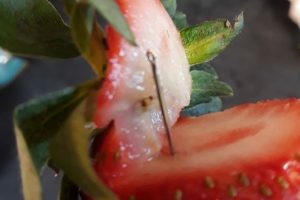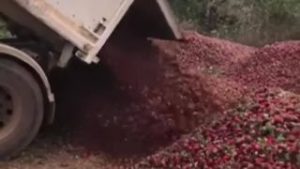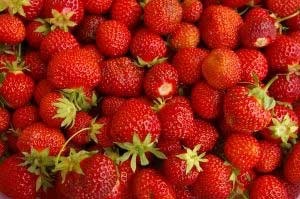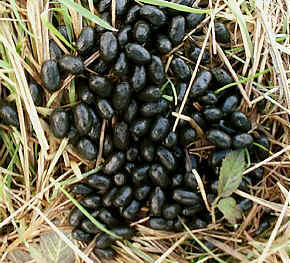With more than 100 reports of tampered fruit being investigated by police across Australia, an Adelaide father has been charged over a fake needle-in-strawberry report.
 Police say the 34-year-old last week reported that his daughter bit into a strawberry purchased at a local supermarket and that it was contaminated with a needle.
Police say the 34-year-old last week reported that his daughter bit into a strawberry purchased at a local supermarket and that it was contaminated with a needle.
The arrest comes as the hunt for those responsible for sticking needles in strawberries continues, and the federal government ramps up penalties for so- called “food terrorists.”
Food tamperers could spent 10 to 15 years behind bars under draft laws passed by the government on Thursday.
One young boy in NSW has already been arrested over behaviour that “could be called a prank”, police said, and he will be dealt with under the youth cautioning system.
The warning comes as Prime Minister Scott Morrison looks to punish ‘cowards’ who purposely contaminate food.
Culprits could face up to 15 years jail under tough updates to food contamination laws the PM will urgently push through parliament this week.
And “idiots” who post Facebook hoaxes about fake contamination cases could face up to 10 years in jail under new measures to deal with “reckless” behaviour.
‘Sabotage’ laws will also be updated to include the sabotage of “goods for human consumption” where it impacts national security.
“Any idiot who thinks they can go out into a shopping centre and start sticking pins in fruit and thinks this is some sort of lark or put something on Facebook which is a hoax, that sort of behaviour is reckless and under the provision we will be seeking to introduce swiftly, that type of behaviour would carry a penalty of up to 10 years in prison,” Prime Minister Morrison said today.
“It’s not a joke. It’s not funny. You are putting the livelihoods of hard-working Australians at risk and you are scaring children,” he said.
“You are a coward and a grub. And if you do that sort of thing in this country we will come after you and we will throw the book at you.”
Meanwhile, the strawberry scandal’s costing the industry millions of dollars, but it’s created a booming trade for one food safety company.
A&D Australasia provides metal detectors to food production companies, and their sales in the last week – including in New Zealand – have skyrocketed.
 Spokesperson for the company Julian Horsley says he’s sold a year’s worth of products in just four days.
Spokesperson for the company Julian Horsley says he’s sold a year’s worth of products in just four days.
“There’s an element of panic obviously because customers are saying we can’t buy your product until this and this are in line – so that’s obviously a commercial panic to them” he said.
Each detector costs around $22,000, but Horsley says growers are viewing them as an investment.
“For these guys it’s either put my produce in the rubbish bin, or supply it to the customers.”







 strain turned up in samples from fields in three separate locations.
strain turned up in samples from fields in three separate locations. .jpg) But the calls didn’t stop there. What they discovered is that the berries sometimes changed hands, traveling from buyer to farmers markets and then to consumers.
But the calls didn’t stop there. What they discovered is that the berries sometimes changed hands, traveling from buyer to farmers markets and then to consumers.